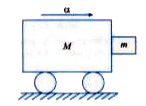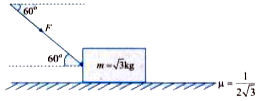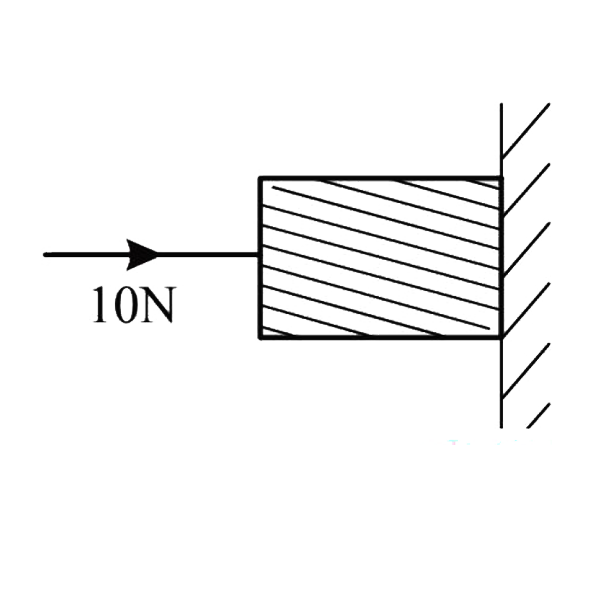Complete Solutions to MANDATORY EXERCISE. (EXERCISE SET I) of chapter FRICTION of Class 9 book with complete answers and questions
| Class 9 | PHYSICS |
| Chapter | FRICTION |
| CENGAGE PHYSICS | MANDATORY EXERCISE. (EXERCISE SET I) |
| Number Of Questions | 31 |
| Academic Year | 2023-24 |
Arrange the following in ascending order of their magnitude.
Rolling friction, static friction, kinetic friction, limiting friction.
View SolutionWhy do tyres of vehicles have tread?
View SolutionExample why:
(i) we slip when step on a banana pell.
(ii) lubricants are used in matchines.
(iii) a hover-creft travels much faster then a steamer pushing through water.
(iv) aeroplanes, missiles, and space ships have their front pointed.
View SolutionTwo identical wooden blocks (A and B) are kept as known in the figure. When you push the blocks, which of the blocks would experience less frictional force? State the reason.

View SolutionIf a constant retarding force is applied on an object moving backwards, i.e., `nu=u-at` becomes negative after `(at>u)` .But, even if you hold the brake lever pressed in your bicycle, it does not go backwards after coming to rest. Comment.
View SolutionYou can keep a book pressed against a wall and prevent it from falling down. Can this horizontal force applied cancel the weight which is a vertical force? Explain.
View SolutionWhy is it easier to maintain the motion than to state it?
View SolutionIn order to stop a car in shortest disatance on a horizontal road one should
View SolutionIf the normal force is doubled, the coefficient of friction is
View SolutionFor a block kept on a table, the maximum force of static friction is `F_(1)` . If the set-up is taken to moon, the force is `F_(2)`. Then
View SolutionA scooter generally slips on an oily road, because
View SolutionA body of mass 100 g is made just to slide on a rough surface by applying a force of 0.8 N. Find the coefficient of friction. Take `g=10 m s^(2)`.
View SolutionA weight 'W' rests on a horizontal plane. What will be the least force required to move the body alone the plane,if the angle of friction is 0?
View SolutionA horizontal force of 10 N is necessary to just hold a block stationary against a wall. The coefficient of friction between the block and wall is 0.2. What is the weight of the block?

View SolutionA mass of 4 kg rests on a horizontal plane. When the plane is gradually inclined to an angle 0 -15° with the horizontal, the mass just begins to slide. What is the coefficient of static friction between the block and the surface? [Given, tan 15° = 0.2679)
View SolutionThe ratio of `mu_(k)` (kinetic friction) and `mu_(s)` (state friction) is
View SolutionWhat is the relation between the normal reaction acting on a surface and the limiting friction on the surface?
View SolutionA block of mass 0.1 kg is held against a wall by applying a horizontal force of 5 N on the block. If the coefficient of friction between the block and the wall is 0.5, then the magnitude of the frictional force acting on the block is
View SolutionThe block of mass m is in contact with a moving cart as shown in the figure.The coefficient of friction between the block and the cart is . The acceleration a of the cart that will prevent the block from falling is

View SolutionA block is placed on an inclined plane. The angle of inclination of the plane is such that the block slides down the plane at a constant speed. The coefficient of kinetic friction is
View SolutionFind the maximum value of force F such that the block shown in the figure does not move

View SolutionIf F denotes the contact force, f denotes the frictional force exerted by one surface on the other, `F_(N)` denotes the normal reaction force between the two respectively and none of them are zero, then
View SolutionIn the figure, blocks A and B weigh 20 N and 100 N respectively. The blocks are being pressed by an unknown force F. If the coefficient of friction between the blocks is 0.1, find the force of friction between the block and the wall if the blocks are in equilibrium

View SolutionA rocket is fired vertically from the earth with an acceleration of 2g, where g is the gravitational acceleration. On an inclined plane inside the rocket, making an angle o with the horizontal, a point object of mass m is kept. The maximum coefficient of friction between the mass and the inclined surface such that the mass does not move is
View SolutionA horizontal force of 10N is necessary to just hold a block stationary against as well. The coefficient of friction between the block and the wall is 0.2. The weight of the block is

View SolutionThe acceleration of a moving body down a rough inclined plane is
View SolutionA body of mass Mis kept on a rough horizontal surface with friction coefficient `= mu`. A person is trying to pull the body by applying a horizontal force but the body is not moving. The force by the surface on A is F where
View SolutionA block of mass `m` is placed at rest on a horizontal rough surface with angle of friction `phi`. The block is pulled with a force `F` at an angle `theta` with the horizontal. The minimum value of `F` required to move the block is
View SolutionA block rests on a rough inclined plane making an angle of 30° with the horizontal. The coefficient of static friction between the block and inclined plane is 0.8. If the frictional force on the block is 10 N, the mass of the block is
View SolutionA force is linearly increasing with time, on a block of mass m placed on the horizontal surface. The friction coefficient from the block and the ground is u. The graph of friction force and time is drawn. Which of the following graph is correct.
View SolutionIn the figure shown, the frictional coefficient between the table and the block is 0.2. Find the ratio of tensions in the right and the left strings.

View Solution
MANDATORY EXERCISE. (EXERCISE SET I) questions and complete solutions for chapter FRICTION of CENGAGE PHYSICS of Class 9
All Exercises from CENGAGE PHYSICS Class 9 PHYSICS FRICTION
- CHALLENGING EXERCISE
- CONSOLIDATED EXERCISE.
- CONSOLIDATED EXERCISE. (MULTIPAL-CHOICE QUESTION WITH ONE OR MORE THAN ONE CORRECT ANSWER)
- MANDATORY EXERCISE. (EXERCISE SET I)
- OLYMPIAD AND NTSE LEVEL EXERCISES
- OLYMPIAD AND NTSE LEVEL EXERCISES (Read the given statements and select the correct option.)
- WORKED EXAMPLES